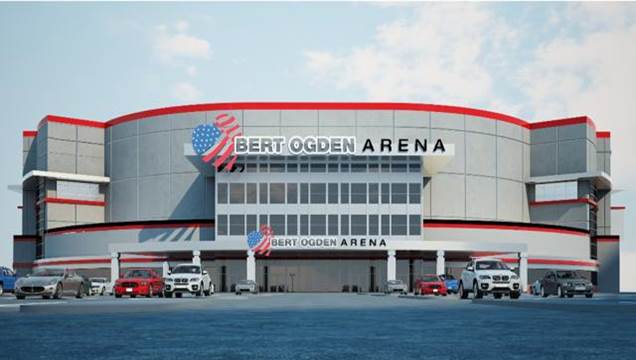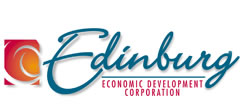
Issuer: City of Edinburg
Project: Bert Ogden Arena Financing
Par Amount: $65.8mm over 5 transactions
Executive Summary This complex financing of a $68mm sports arena in South Texas involved (i) the contribution and participation of 4 municipal entities and 2 separate developers, (ii) the refinancing of 3 loans and 5 bond transactions, and (iii) the execution of multiple project development agreements. This transaction was undertaken by a small community on the Lower Rio Grande Valley that had less than $100mm in outstanding bonds prior to the transaction. The community is rapidly growing (having grown 71% in population from 2000-2014), and needs civic amenities like the sports arena that will be used for sporting and community events.
Background on Why the Deal was Done: The City of Edinburg (the “City”), rated AA-/AA- (S/F) and a rapidly growing community along the Rio Grande Valley in South Texas, is working with a local developer to build the $68 million, 8,500 seat Bert Ogden arena (the “Facility”) that will be the home to the Rio Grande Valley Vipers, a ten year old franchise and two-time champion of the NBA Development League. The Facility, which will open in the fall 2016, is a joint partnership between the City and Vipers Arena, LLC, (the “Developer”) a development company owned by Alonzo Cantu, a local developer who has majority ownership of the team. The City will contribute $30 million to the Facility, while the Developer will contribute the balance and any cost overruns during construction. The City will own the Facility and the Developer will make lease payments during the term of the lease.
Transaction History and Structure: The City and Developer originally planned to finance the $30 million City contribution from (i) tax increment and sales tax revenue generated from a Tax Increment Reinvestment Zone (TIRZ #4) established around the Facility and adjoining areas, and (ii) lease payments from the Developer. The City’s financial advisor, Estrada Hinojosa & Company, Inc. (“EHCI”) reviewed the pro forma and did not think that this plan was feasible. Subsequent discussions with commercial banks confirmed that sentiment.
In response to the failed original plan, EHCI and bond counsel McCall Parkhurst and Horton (“MPH”) worked together to fashion a new finance plan, and one that included proven revenues that would result in an investment grade rating and be palatable to the capital markets. The solution was to tap the excess sales tax revenue generated from the Edinburg Economic Development Corporation (“EEDC”), which was established in the early 90s and that provided nearly $4.7mm of sales tax revenues in FY 2014. In addition, the financing would incorporate tax increment and sales tax revenue generated by TIRZ #1, another TIRZ used to finance the development of a 460K SF shopping mall complex.

In order to access these two revenue sources, the finance plan had to refinance or retire three existing loans on the EEDC balance sheet, and pay the developer of the TIRZ #1 shopping center some incentive payments they were due to receive over the next few years. The finance plan took shape in the form of five transactions:
- EEDC Refinancing of two outstanding loans (one from a local bank, the other from the State of Texas). These restructured debt service to create near term debt capacity and were secured by a senior lien of EEDC
- sales tax revenue. Transaction: $13.7mm Sales Tax Revenue Refunding Bonds, Taxable Series 2015.
- Edinburg Local Government Finance Corporation (“ELGFC”) contract revenue financing of the Facility. These bonds were issued by the ELGFC and used to pay for the City’s $30 million contribution plus a portion to pay the TIRZ #1 developer incentive payments. The Bonds were secured by a subordinate lien of EEDC sales tax revenue, TIRZ #1 tax increment revenue, TIRZ #4 tax increment revenue, City Sales taxes from TIRZ #1 and #4, and Developer lease payments. Transactions: $37.3mm Contract Revenue Bonds, Series 2015 and $3.5mm Contract Revenue Bonds, Taxable Series 2015.
- Edinburg Certificates of Obligation to take out EEDC loan and for other City capital needs. These bonds were secured by the City’s General Obligation authority. Transactions: $7.5mm Combination Tax and Revenue Certificates of Obligation (“COs”), Series 2015A and $3.9mm Combination Tax and Revenue Certificates of Obligation, Series 2015B.
This financing was developed over a period of seven months. Citigroup was identified as the sole underwriter due to their extensive experience on sports arena financings and marketing complex transactions. The bonds received the following ratings: a) EEDC bonds: AA-/AA- (S/F), b) ELGFC bonds: BBB+ (S&P only) and AGM insured, COs: AA-/AA- (S/F).

